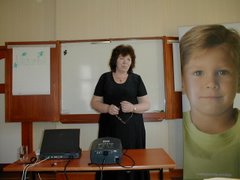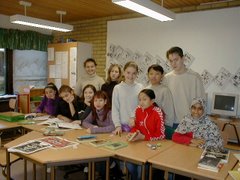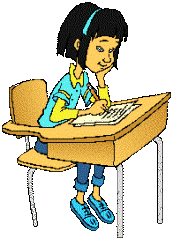A child around 7 years of age knows and uses about 10 000 words. However, the circumstances for most of the foreign children vary according to the age they start the school in another country than they were born. Some of the children emigrate in the school age and speak and read the mother tongue on the level according to their age. But a great part of the refugee children has grown up the places with a poor language stimulance, with completely different needs of the language then in the Western Countries, or without a possibility to attend the school. Even different diseases, malnutrition, personal or family problems, physical or psychical problems etc. have the influence on the child’s language development.
Some children migrate in the school age, some are born in the new country but only talk the mother tongue without any possibility to hear or speak the “second language”. These children develop only a partial language and understanding. They miss a stimulation a child normally gets in the surroundings where they meet the language in daily use. Often they only use a partial language necessary for the need, without being able to develop the language in whole. These children need all possible stimulation they can get - talk, listen, write and think.
This project turns mainly to children 13 – 16 y, learning the language as a second language, but it can even be used for any class learning a mother - or foreign language in WHOLE. According the studies the refugee children in common have more problems with a language development, learning to read and abstract thinking. Each student needs the access to a PC. No books are necessary, each student makes his/her own material. The work with these own texts makes the student aware of that there are different sorts of languages for different sorts of purposes, and he learns to use this knowledge the conscious way.
1. Interactive language training on PC
Each student trains the parts (spelling, vocabulary, grammar) needed to be trained according to his/her language problems and has a responsibility for noting the results of exercises. The various language programs are used for reaching the expected result.
2. Spelling – work with PC:The teacher chooses the new or trained words for a dictation. The spelling control is not active. After the correction the new vocabulary is used for writing stories, poems or other text, to rime, theme words – to find a group name etc. This way each student himself makes new exercises and trains the words different ways. The exercise can be exchanged between the students in order to train – to correct each others dictation, to compete.
3. Literature:
Each student reads one book per month - the only homework the student has. The purpose is to stimulate the every day reading habits, interest for literature, vocabulary – THE LANGUAGE AS A WHOLE LANGUAGE. The books are chosen according the interest and language ability. It is important that each student reads the whole book and not looses the interest in reading because of that the book might be too difficult. Each book is presented and discussed in whole group. It is not easy for a learner of another language to express himself/herself on this level - to speak, think about the book and still speak correctly according the grammar rules. A mind map can be used to help the memory – the exercise is for TALKING and LISTENNING – not reading. The other students listen active: put down the questions or thoughts about the book etc. This part of the exercise is for
- speaking fluently in 10 – 15 minutes, keeping to the point, talking to the public, concentration
- speaking correctly according the grammar, using the higher level of the language - not using the slang or youth language, right pronunciation
Each student makes a written presentation of the book on a computer. This part of the exercise is for
- writing the text in whole, grammar , spelling
- expressing in writing – the choice of suitable expressions, writing about the important things in the book, own opinion about the book
The knowledge – using the different computer programs as Word, Graphic, Lay out
4. Writing different sorts of texts on PC:
Each student writes the own text on his/her level:
Poems
Fairy tales and Novels
Presentations of books
Own articles, facts
All material is collected by a teacher who makes a copy:
EACH MONTH: A MAGAZINE WITH THE ARTICLES
TWICE PER SCHOOL YEAR: A POETRY BOOK and A NOVEL/FAIRY TALE BOOK
Each student gets a copy and a copies are also sent to other schools. Each book or newspaper can be used for teaching younger students or students with a lower level of language – for reading etc .
The poetry can be used for different occasions – school celebrations, making music to the text (in music classes) etc.
The books can be illustrated by the writer in the art classes, the pictures scanned and put to the text, or the students can look for clipart on the internet.
If economically possible, the book can be printed at the publisher and students sell the books in order to purchase the new reading books or printing another book or financing other projects..
The project can be used as long as wished. Each student works on his/her level, continually working on making the language level higher. New students can join the group during the time on their own level without disturbing the work of a group. The students inspire each other and can help each other. With new students in the group the number of students can get higher since the students can co-operate and help each other which gives the teacher time and opportunity to help the newcomers.
5. Discussion:- it is important for each person to learn to speak right and to develop the vocabulary a natural way - to express the own opinion, to discuss, to learn how to talk in a group – the culture: turns, to talk to the point etc
- to read and understand the text, to think abstract
- to develop the imagination, to compare: now/ then, here/ there, to see the differences and similarities, to “read between the lines” – to understand even what is not expressed in words, to understand, think, feel, picture
6. Internet based learning:The student looks for interesting stuff on internet in order to use it for working his/her own way, and learns to find necessary stuff fast. Work with the text –reading, understanding more advanced texts – learning the latent vocabulary necessary for reading the text for other school. The texts written on PC are easy to correct for the teacher and to discuss while corrected, easy to follow the line, change the expressions – the final product is still nice to present and inspires to illustrate with clipart, scanned pictures, photos The articles are read, discussed, used for teaching grammar and spelling. The student has a goal to reach – he/she works active and check the progress. The material is collected and used for different purpose.









